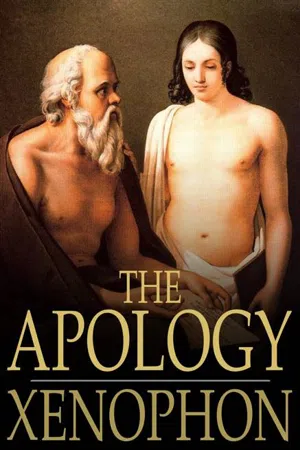
This is a test
- 20 pages
- English
- ePUB (mobile friendly)
- Available on iOS & Android
eBook - ePub
Book details
Book preview
Table of contents
Citations
About This Book
One of the greatest and most influential thinkers in human history, Greek philosopher Socrates was ultimately sentenced to death after being convicted of impiety and corrupting the minds of Athens' youth. However, rather than shirking his death sentence, Socrates emphatically embraced it. In The Apology, Socrates' student Xenophon explains why his prominent teacher chose what some would consider an ignominious end.
Frequently asked questions
At the moment all of our mobile-responsive ePub books are available to download via the app. Most of our PDFs are also available to download and we're working on making the final remaining ones downloadable now. Learn more here.
Both plans give you full access to the library and all of Perlego’s features. The only differences are the price and subscription period: With the annual plan you’ll save around 30% compared to 12 months on the monthly plan.
We are an online textbook subscription service, where you can get access to an entire online library for less than the price of a single book per month. With over 1 million books across 1000+ topics, we’ve got you covered! Learn more here.
Look out for the read-aloud symbol on your next book to see if you can listen to it. The read-aloud tool reads text aloud for you, highlighting the text as it is being read. You can pause it, speed it up and slow it down. Learn more here.
Yes, you can access Apology by in PDF and/or ePUB format, as well as other popular books in Philosophy & Ethics & Moral Philosophy. We have over one million books available in our catalogue for you to explore.
Information
Topic
PhilosophySubtopic
Ethics & Moral PhilosophyThe Apology
*
Xenophon the Athenian was born 431 B.C. He was a pupil of Socrates. He marched with the Spartans, and was exiled from Athens. Sparta gave him land and property in Scillus, where he lived for many years before having to move once more, to settle in Corinth. He died in 354 B.C.
The Apology describes Socrates' state of mind at his trial and execution, and especially his view that it was better to die before senility set in than to escape execution by humbling himself be- fore an unjust persecution. Xenophon was away at the time, involved in the events of the march of the ten thousand.
The Apology of Socrates [1]
*
Among the reminiscences of Socrates, none, as it seems to me, is more deserving of record than the counsel he took with himself [2] (after being cited to appear before the court), not only with regard to his defence, but also as to the ending of his life. Others have written on this theme, and all without exception have touched upon [3] the lofty style of the philosopher, [4] which may be taken as a proof that the language used by Socrates was really of that type. But none of these writers has brought out clearly the fact that Socrates had come to regard death as for himself preferable to life; and consequently there is just a suspicion of foolhardiness in the arrogancy of his address. [5] We have, however, from the lips of one of his intimate acquaintances, Hermogenes, [6] the son of Hipponicus, an account of him which shows the high demeanour in question to have been altogether in keeping with the master's rational purpose. [7] Hermogenes says that, seeing Socrates discoursing on every topic rather than that of his impending trial, he roundly put it to him whether he ought not to be debating the line of his defence, to which Socrates in the first instance answered: "What! do I not seem to you to have spent my whole life in meditating my defence?" And when Hermogenes asked him, "How?" he added: "By a lifelong persistence in doing nothing wrong, and that I take to be the finest practice for his defence which a man could devise." Presently reverting to the topic, Hermogenes demanded: "Do you not see, Socrates, how often Athenian juries [8] are constrained by arguments to put quite innocent people to death, and not less often to acquit the guilty, either through some touch of pity excited by the pleadings, or that the defendant had skill to turn some charming phrase?" Thus appealed to, Socrates replied: "Nay, solemnly I tell you, twice already I have essayed to consider my defence, and twice the divinity [9] hinders me"; and to the remark of Hermogenes, "That is strange!" he answered again: "Strange, do you call i...
Table of contents
- THE APOLOGY
- Contents
- The Apology
- Endnotes